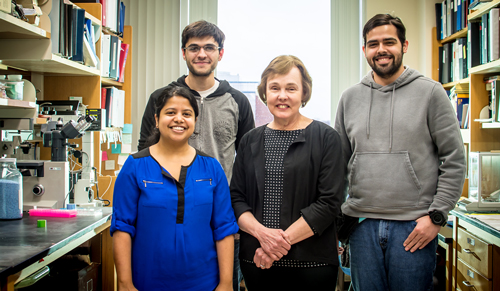Welcome to the Lord Lab
 The Lord lab has a long-standing interest in the microenvironment of solid tumors, the ability of cells of the immune system to infiltrate into tumors, and their ability to function within the challenging conditions of a growing tumor. This interest stems from the knowledge that the effectiveness of conventional cancer treatments such as radiation and chemotherapy are limited by the ability of cells and molecules to enter the tumor. As tumors develop, they initially co-opt existing vasculature to provide the oxygen and nutrients necessary for their growth, but their rapid growth rate overwhelms the normal capacity of the blood vessels and the resulting hypoxia signals the tumor cells to produce pro-angiogenic factors to stimulate the formation of new blood vessels. However, an excess of pro-angiogenic factors that are not balanced by anti-angiogenic factors results in a disorganized and chaotic vasculature that is suboptimal at providing nutrients and allowing the ingress of immune cells. This inefficient vasculature greatly limits the effectiveness of conventional therapies and also the newer immunotherapies.
The Lord lab has a long-standing interest in the microenvironment of solid tumors, the ability of cells of the immune system to infiltrate into tumors, and their ability to function within the challenging conditions of a growing tumor. This interest stems from the knowledge that the effectiveness of conventional cancer treatments such as radiation and chemotherapy are limited by the ability of cells and molecules to enter the tumor. As tumors develop, they initially co-opt existing vasculature to provide the oxygen and nutrients necessary for their growth, but their rapid growth rate overwhelms the normal capacity of the blood vessels and the resulting hypoxia signals the tumor cells to produce pro-angiogenic factors to stimulate the formation of new blood vessels. However, an excess of pro-angiogenic factors that are not balanced by anti-angiogenic factors results in a disorganized and chaotic vasculature that is suboptimal at providing nutrients and allowing the ingress of immune cells. This inefficient vasculature greatly limits the effectiveness of conventional therapies and also the newer immunotherapies.
My lab has focused on how radiation treatment alters the tumor microenvironment and its effects on the immune system. Our studies have clearly demonstrated that the immune response plays an essential role in the efficacy of radiation therapy in that the tumor cell death caused by radiation treatment results in release of antigens and damage associated molecular patterns (DAMPS) that stimulate immunity. However, radiation can also damage the cells of the immune system. We are now studying how to best utilize the timing and dose schedules of radiation therapy to stimulate immune function. Larger doses of radiation delivered in a few fractions appear to be more effective at stimulating immunity, but smaller doses given more often have been the conventional treatment approach due to the need to limit damage to normal tissues. However, newer technologies can now deliver radiation more precisely, allowing the use of larger doses. This technology is now available for delivery to mouse tumor models (small animal radiation research platform -SARRP) and is enabling the treatment of orthotopically situated mouse model tumors even in highly sensitive organs such as the colon.

Edith M. Lord, Ph.D.
Principal Investigator
Publications
View All Publications- Improving SBRT by re-wiring immunosuppressive neutrophils in murine pancreatic ductal adenocarcinoma.; International journal of radiation oncology, biology, physics. 2025 Jul 01.
- Blockade of LIF and PD-L1 Enhances Chemotherapy in Preclinical PDAC Models.; Cancers; Vol 17(2). 2025 Jan 09.
- Integrating IL-12 mRNA nanotechnology with SBRT eliminates T cell exhaustion in preclinical models of pancreatic cancer.; Molecular therapy. Nucleic acids; Vol 35(4), pp. 102350. 2024 Sep 30.
- New insights into the responder/nonresponder divide in rectal cancer: Damage-induced Type I IFNs dictate treatment efficacy and can be targeted to enhance radiotherapy.; Cell death & disease; Vol 14(7), pp. 470. 2023 Jul 26.
- CD73 and PD-L1 dual blockade amplifies antitumor efficacy of SBRT in murine PDAC models.; Journal for immunotherapy of cancer; Vol 11(5). 2023 May.
Contact Us
Edith Lord Lab
MRBX 2-11001
601 Elmwood Ave
Rochester, NY 14642


